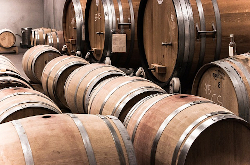최후의 수단을 쓰다

Today we talk about a problem we have all faced. It is when you have to make a decision, but the choices you have are not very appealing. In fact, some of those choices are really bad.
We have all had to choose from leftovers that no one else wanted. In other words, we had to scrape the bottom of the barrel.
As you probably know, a barrel is a round, usually wooden container. It has curved sides and flat ends.
Barrels are often found on farms. They are usually strong and good for holding tools. Some makers of alcoholic drinks, such as wine and bourbon, let their products age in oak barrels. Some people say the right wood gives the final product a smoky quality.
Hundreds of years ago, barrels had another -- much more important -- purpose. This was long before the United States became independent. Before then, people often stored preserved food in barrels and then put the barrels in cold rooms. This would keep the food from going bad.
A professor at the University of Connecticut studied this custom. D. M. Kinsman's report is called Meat Preparation and Preservation in Colonial America.
Kinsman writes that many colonial families got through cold winters by keeping their meat supplies in a barrel filled with salted water, or brine. Then they kept the barrel in a cold room.
He added that the salted meat “barrel … and the icy chilliness of winter cold rooms saw many a northern colonial family through what might otherwise have been a disastrous year.”
Over time as people ate from the barrel, the food stored would slowly disappear. Finally, when supplies were nearly gone, hungry people had to take whatever they could find from the bottom of the barrel. This was probably the worst food available.
And this is where the expression "to scrape the bottom of the barrel" comes from.
You can also simply say the “bottom of the barrel.” When you have used up all the good choices, you have hit the bottom of the barrel. So, hitting the bottom of the barrel means you will probably have to settle for a less desirable option.
You are choosing something simply as a last resort. When nothing else is available or works, we simply choose the last resort.
These are all great ways to describe times when your choices are less than perfect. Now, let's hear how to use these expressions in a conversation.
Two friends are on vacation. They have gone to a quiet seaside town for a week. However, the clouds are moving in. Let's listen as they discuss their options for some quiet reading time indoors. You can also learn some useful beach terms!
Too bad it's raining.
Well, it's a good thing we spent all day yesterday enjoying the sun and swimming in the ocean.
You're right. I think I'll sit back with a good book.
Good idea. Hey, there are some books on this bookcase.
Perfect. I love how people on vacation leave behind their beach reads. Can you read some of the titles?
Let's see. Would you rather read Love at Low Tide or Sandcastle Romance?
I'm not really in the mood for a romance novel. What else is there?
Hmm. There’s some self-help books: Surviving a Coast-to-Coast Relationship and When it Comes to Love Are You Lost at Sea?
No, thanks.
Romance on the Waves?
Are you serious?!
Okay. As a last resort, you could read The Sexiest Sunburn.
Who thinks of these titles?! There has to be something else other than romance novels.
Nope. We are really scraping the bottom of the literary barrel with these choices. We may have to settle on reading some take-out menus.
Oh, I give up! We're on vacation. Hand me Romance on the Waves. If we’ve reached the bottom of the barrel, I might as well enjoy it! What about you?
I wasn’t kidding about reading the take-out menus. I’ll find us something good for dinner.

